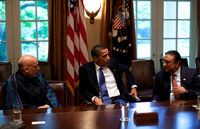There is a profound sense of completion to be found in America's elimination of Osama bin Laden, and the circumstances surrounding his death certainly fit this frontier nation's historical habit of mounting major military operations to capture or kill super-empowered bad actors. Operation Geronimo, like most notable U.S. overseas interventions of the past quarter-century, boiled down to eliminating the one man we absolutely felt we needed to get to declare victory. Now we have the opportunity to redefine this "long war" to America's most immediate advantage. I spot four basic options, each with their own attractions and distractions.
Declare victory and go home. This is what the bulk of the American public wants, and that desire shouldn't be casually dismissed as naïve. After all, we went to Afghanistan to dismember al-Qaida's central leadership cell there, and by all accounts, we've basically accomplished that mission. Al-Qaida's headquarters staff is in permanent, off-the-grid hiding -- overwhelmingly in Pakistan. It has also been reduced to providing leadership that is more inspirational than operational in character. Tactically speaking, the network's center of gravity sits today in Yemen with al-Qaida in the Arabian Peninsula (AQAP). Given the instability and proliferation risks of Libya's civil war, we must also consider al-Qaida in the Islamic Maghreb (AQIM) to be of second-order importance. Staying in Afghanistan keeps us in bed with Pakistan, which means continuing to provide massive military aid to the closest thing China has as a military ally. If we're so worried about China's growing might, this path seems downright goofy. Afghanistan's run as the "good war" is officially over.
Press on maximally -- in Pakistan. Over time, this would require only a small-footprint presence in Afghanistan to facilitate cross-border strikes that will eventually get us kicked out of Pakistan anyway. The aid price tag Kabul will demand in return for allowing us to maintain bases in Afghanistan for this purpose has to be less than the $20 billion we've doled out to Pakistan since Sept. 11, the vast majority of which has been diverted to purposes other than those intended. Pakistan, for example, is on the verge of fielding tactical nuclear weapons vis-à-vis India, paid for by us! We are heading toward eventual containment of Pakistan, even as we are loath to admit it to ourselves. But with the help of the hefty intelligence haul from bin Laden's compound, we should strike at additional targets while the iron remains hot -- whatever the consequences. We can't draw down too fast in Afghanistan anyway, so President Barack Obama's instinctive preference for the aggressive use of drones, special operations hunters, CIA paramilitary teams and the like is right on the mark. If Obama's talk of sticking with Pakistan is just cover for such a maximal push, then fine. But if he's serious about lashing U.S. strategic interests to this failed and fake state, then we've just bought ourselves a West Asian version of North Korea.

